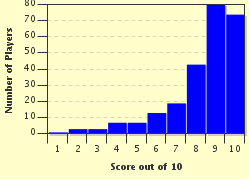Quiz Answer Key and Fun Facts
1. Which famous Englishman sent the signal, "England expects that every man will do his duty", before the famous Battle of Trafalgar?
2. The first Chief Scout of The Boy Scouts' Association, which famous Englishman was also an accomplished artist?
3. Who was the first person to establish a theory of cosmology which was explained by merging the theory of relativity and quantum mechanics?
4. Married to Prasutagus, which Queen of the Iceni is famous for the rebellion she led during the time of Emperor Nero in Rome?
5. Which Anglican cleric, who traveled and preached outdoors, was described as "the best loved man in England" by the time of his death in 1791?
6. Described as the "first composer to take the gramophone seriously", who composed the "Pomp and Circumstance Marches"?
7. Which English merchant and writer is considered to be the first to introduce the printing press in England?
8. A favorite of Queen Elizabeth I, who popularized the use of tobacco in England?
9. Name the English scientist who is given credit for inventing the first programmable computer, as well as a difference engine, which was a mechanical calculator.
10. Although imprisoned many times, which suffragette said, after her first incarceration, that it was "like a human being in the process of being turned into a wild beast."
Source: Author
ponycargirl
This quiz was reviewed by FunTrivia editor
bloomsby before going online.
Any errors found in FunTrivia content are routinely corrected through our feedback system.


